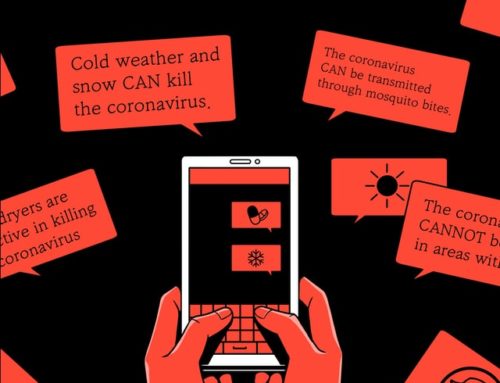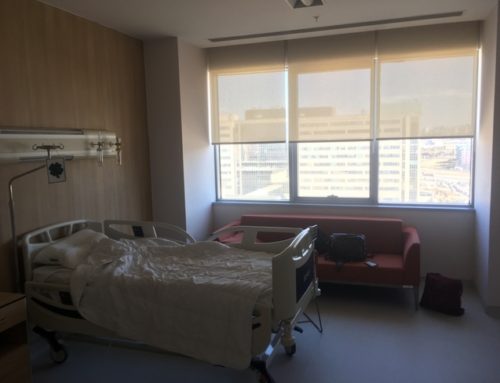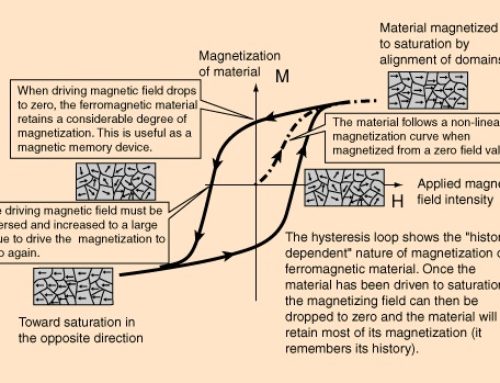Lawnmowers hum outside. The air smells of cut grass and fertilizer. I sit at the kitchen table in my apartment in central Illinois, trying to focus on the article I am supposed to be reading for class. Mid-morning light shines in through the sliding glass door. Jeff Buckley’s voice croons “Hallelujah” from my partner’s laptop in the living room, an exclamation that feels far from appropriate. My mind wanders.
For many anthropology graduate students, Covid-19 has rearranged our lives and our careers. Especially affected are anthropology students whose long-term dissertation fieldwork was interrupted. Many of my colleagues were forced to drop their fieldwork and jump on planes back to the USA before travel shut down. A kind of displacement obligated by global crisis, yet defined by the privilege of passports, visas, and the economic resources to purchase a last-minute ticket.
My situation is slightly different, though similarly privileged: a displacement of plans. I was supposed to begin long-term fieldwork in Ecuador in August 2020, to support a dissertation about the ongoing displacement of Colombian refugees in Quito. While Ecuador positions itself as a place of refuge and security, Colombians fleeing their country’s decades-long armed conflict often find no such reprieve across the border. Members of armed groups often follow victims into Ecuador, continuing to harass, threaten, and demand bribes from them. Furthermore, Colombians experience ongoing displacement in Ecuador due to racism, sexism, xenophobia, nationalism, and poverty. I had intended to research how these experiences of displacement are embodied in Colombians’ everyday mobilities through Quito.
Years of planning and preparing for long-term dissertation fieldwork in Ecuador currently feel futile. The country has become a global epicenter of the Covid-19 disaster, and travel and fieldwork there will be impossible for the foreseeable future. International headlines in early April reported that the healthcare and mortuary system in Ecuador had collapsed, as virus-ravaged bodies lay in the streets of Guayaquil, Ecuador’s largest city of almost 3 million (Faiola & Herrero 2020). Politicians blamed a supposedly “undisciplined” population that refused to comply with shelter-at-home orders, overlooking the fact that lockdowns are useless unless the government provides income and support for people, many of whom are forced to leave their homes each day in order to survive in the informal economy. A friend in Ecuador—a disabled senior and immigrant from Chile—told my partner over the phone that the Ecuadorian government had provided him with Covid-19 assistance in the form of a single roll of toilet paper, a bag of sugar, a can of tuna, and a small box of tea bags. This was supposed to last him the month.
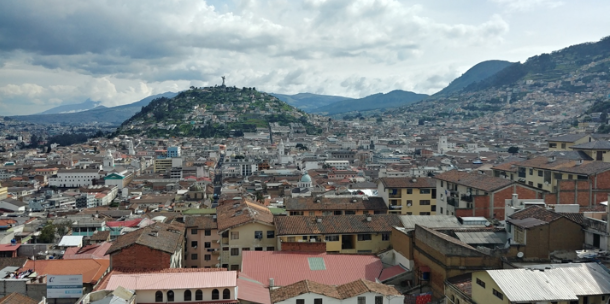
Quito, Ecuador during calmer times. Urban spaces in which people live in close proximity and depend on participation in an informal economy are especially vulnerable to the spreading of Covid-19. Photo by the author.
The severity of the Covid-19 crisis in Ecuador was not inevitable, but the result of a recent shift in governance. With the rise of President Lenín Moreno in 2017, the Ecuadorian electorate thought they were voting in the political successor of Rafael Correa, leftist and self-professed leader of “twenty-first century socialism” who governed the country from 2007-2017. In reality, in 2017, they had elected a leader whose quick and strange about-turn revealed him as a Trump-friendly capitalist who, since his election, has reintroduced austerity programs backed by the neo-imperialist International Monetary Fund (IMF), made international headlines for his sexist comments, and, most relevant for Covid-19, has spent his three years in office butchering what was once a functioning public healthcare system: slashing spending by around 200 million dollars, firing almost 4,000 healthcare workers in 2019 alone, and refusing to allocate the necessary resources for responding to the current pandemic (Schützhofer 2020).
These decisions have inflamed the crisis. Especially vulnerable during this pandemic are Colombian and, more recently, Venezuelan refugees in Ecuador, especially those who are indigenous, black, women, gender nonconforming, LGBTQ, and poor. Some refugees are even attempting to return to their home countries due to a lack of security in Ecuador. In the wake of Covid-19, many have lost what little employment they were able to find, and fear for their health and their lives. In early May, dozens of Venezuelan refugees in Ecuador attempted to cross Rumichaca International Bridge back into Colombia. Rather than offering them humanitarian passage through to Venezuela, however, Colombian police used tear gas and other means of violence to contain these refugees and push them back into Ecuador. A global pandemic lays bare what refugees already know: Displacement is never-ending.
Closer to home, the situation for refugees is also dire. Since he took office, Trump has waged war on the asylum system and on migrants and refugees from the global South. Things have only worsened during the pandemic. On March 20, the Center for Disease Control issued an order authorizing the rapid “expulsion” of noncitizens who arrive by land at U.S. borders without documentation, essentially denying refugees their right to request asylum. On April 21, Trump announced he would temporarily suspend the issuing of green cards (permanent residency status) in order to “protect American jobs.” As the U.S. government slowly rolled out bare-bones Covid-19 emergency funds to U.S. citizens in the form of the CARES Act and the hope of a one-time $1200 payment, immigrants and refugees were denied access to this aid, as were U.S. citizens married to immigrants, a decision for which Trump is currently facing a lawsuit. The government refuses to empty detention centers across the USA, allowing the virus to spread rapidly among incarcerated immigrant populations. An increase in deportations literally sends Covid-19 to the global South, exacerbating the spread of the virus (Campbell 2020). These various orders and policies demonstrate how the USA expands its project of anti-immigrant white nationalism—a project of sickness and suffering—in the name of “health” and “security.”
Within my community of Urbana-Champaign, people are facing job loss, food insecurity, and precarious access to healthcare. Instead of preparing for and taking my preliminary exams to advance to doctoral candidacy, my energy has shifted to food distribution and union organizing. Churches and school districts are organizing food deliveries for affected families. And graduate students at the University of Illinois at Urbana-Champaign (UIUC), where I am a doctoral student, have been mobilizing through our Graduate Employees’ Organization (GEO) to demand that the university cover the cost of our summer health insurance and rescind its decision to increase the cost of health insurance coverage by 33% for the fall semester. The administration’s austerity puts us all at risk, particularly those of us with chronic illnesses and disabilities that require ongoing medical care. Despite a tentative GEO win in May, where the university announced that it would provide 87% of summer healthcare coverage for most graduate students, we are compelled to continue organizing to defend our health and our lives in the fall.
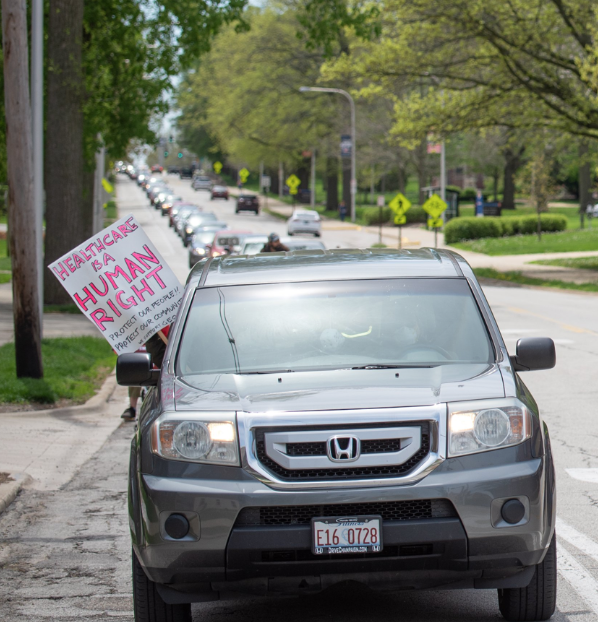
The Graduate Employees’ Organization at the University of Illinois at Urbana-Champaign organized the “Drive to Survive” rally on May Day (May 1), 2020, in order to demand that the university provide summer healthcare coverage and no premium hikes to health coverage in the fall. Photo by Ben Joseph Lash.
At the same time, a global pandemic also shines light on the privileges from which some doctoral students benefit. During the semester, I continue to receive a monthly stipend with healthcare. I am able to safely shelter at home. A typical day still involves the attempt to read, punctuated by answering students’ worried emails about their grades; creating a flyer for our union’s rally; signing up for a webinar event. My version of “stuck-in-place” is relatively safe and comfortable.
Although my life and career may be on hold because of travel restrictions and a world that feels like it is crumbling, I am in a position that allows me to ask: What would a world look like beyond the crumbling? In Ecuador, as in the United States, a world beyond the crumbling would involve a shift in governance to prioritize people’s lives over profit: it would look like the decision to fund public healthcare, to cut ties with the IMF, to demilitarize and open borders for the sanctuary of refugees, and to provide Covid-19 assistance beyond a roll of toilet paper or a one-time check. In Ecuador, as in the United States, a world beyond the crumbling would look like collaboration with neighboring countries to confront the conditions, rooted in colonialism and capitalism, that force so many people from the global South to flee their homes and seek refuge, and that simultaneously force them to remain in place, where their health and their lives continue to be at risk. For graduate students at Urbana-Champaign, it would look like a university administration that puts people’s lives first by providing accessible healthcare coverage and a living wage.
Nowhere would a world beyond the crumbling involve returning to a “before” or settling for what currently exists: a world in which so many are forcibly displaced, so many contained in cages, so many deported, and now, so many forced to stay.
References:
Campbell, Monica (2020). “US Deportation Flights Risk Spreading Coronavirus Globally.” Public Radio International website, April 14. Accessed April 29, 2020. https://www.pri.org/stories/2020-04-14/us-deportation-flights-risk-spreading-coronavirus-globally
Faiola, Anthony, & Ana Vanessa Herrero (2020). “Bodies Lie in the Streets of Guayaquil, Ecuador, Emerging Epicenter of the Coronavirus in Latin America.” The Washington Post website, April 3. Accessed April 27, 2020 from https://www.washingtonpost.com/world/the_americas/coronavirus-guayaquil-ecuador-bodies-corpses-streets/2020/04/03/79c786c8-7522-11ea-ad9b-254ec99993bc_story.html
Schützhofer, Timm Benjamin (2020). “In Ecuador, Lawfare Marches on Despite Coronavirus.” North American Congress on Latin America website, April 27. Accessed April 29, 2020. https://nacla.org/news/2020/04/28/ecuador-lawfare-marches-despite-coronavirus?fbclid=IwAR0EaOSatcqSF7iix0TUa4tvl0qOsQDbTzz_fgiwjDT9dmHqBZf1fxLqBKg
Cite As: Ackerman, Alana. 2020. “Displaced in Place: On Being Forced to Move and Forced to Stay During a Global Pandemic,” Gabriela Manley, Bryan M. Dougan, and Carole McGranahan, eds., American Ethnologist website, 15 June 2020 [https://americanethnologist.org/panel/pages/features/pandemic-diaries/making-sense-of-things/displaced-in-place-on-being-forced-to-move-and-forced-to-stay-during-a-global/edit]
Alana Ackerman is a PhD student in anthropology at the University of Illinois at Urbana-Champaign. She can be reached at asacker2@illinois.edu
